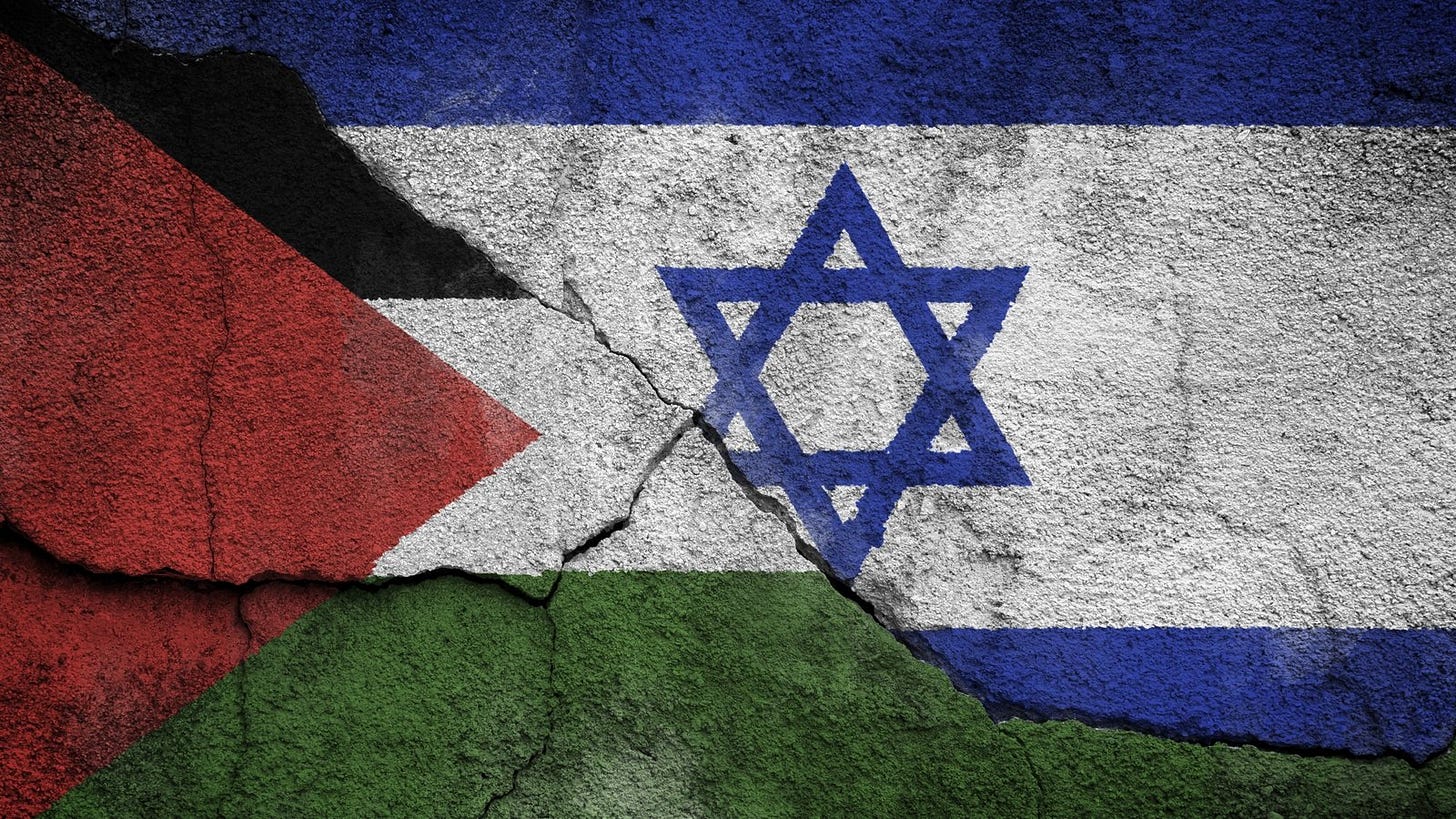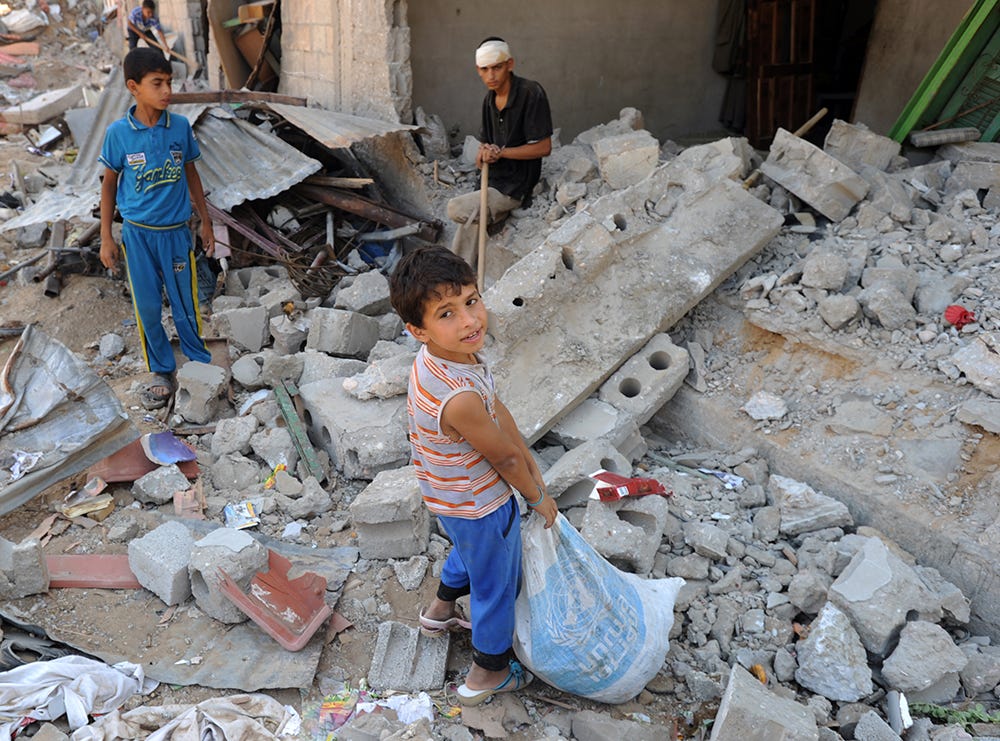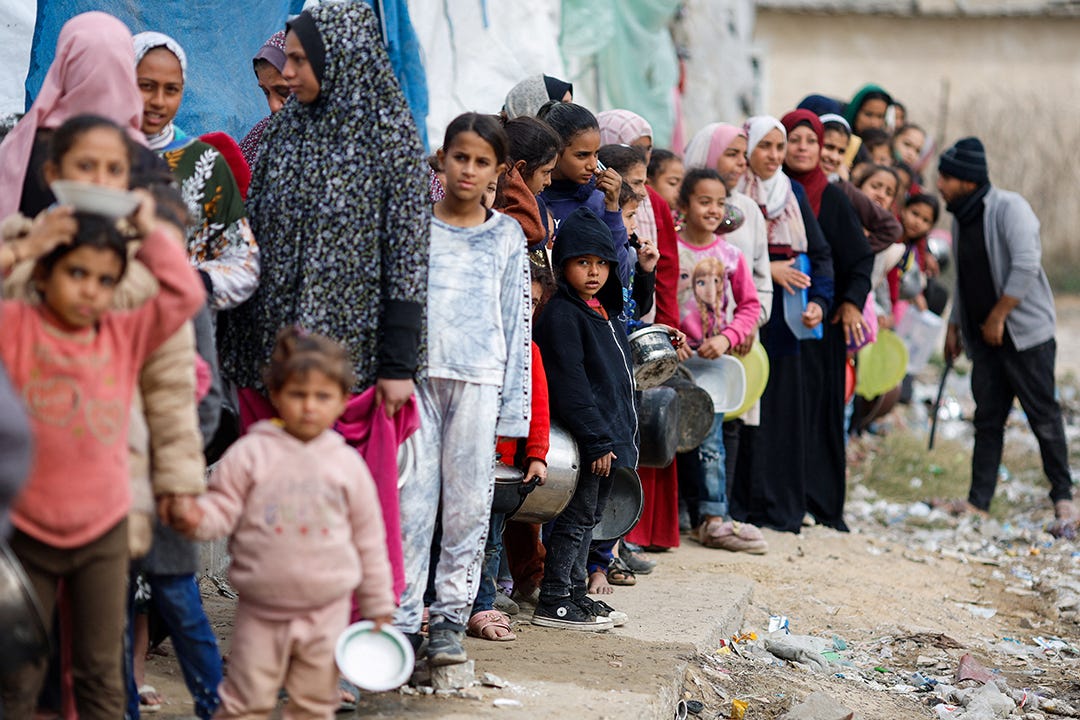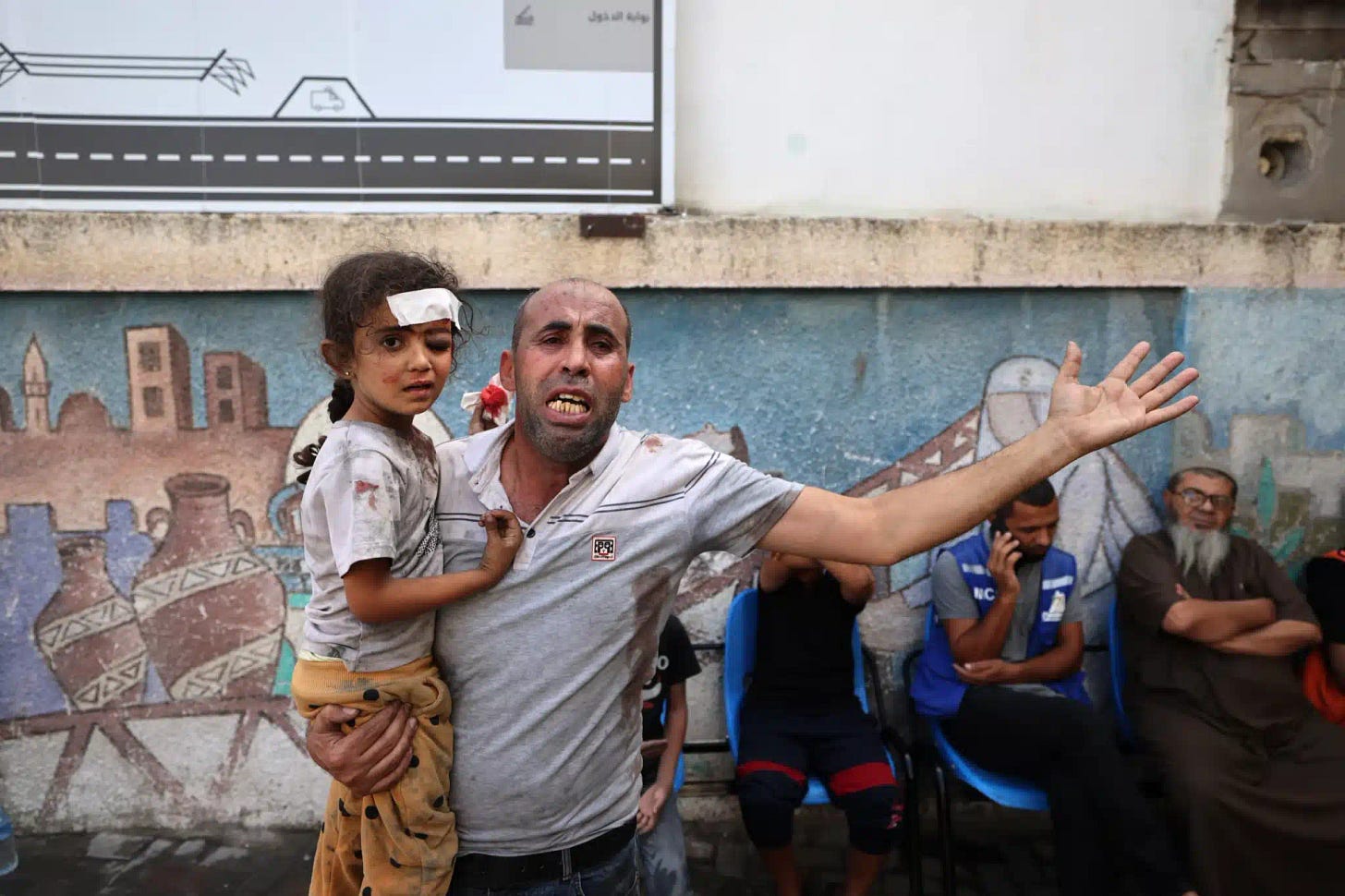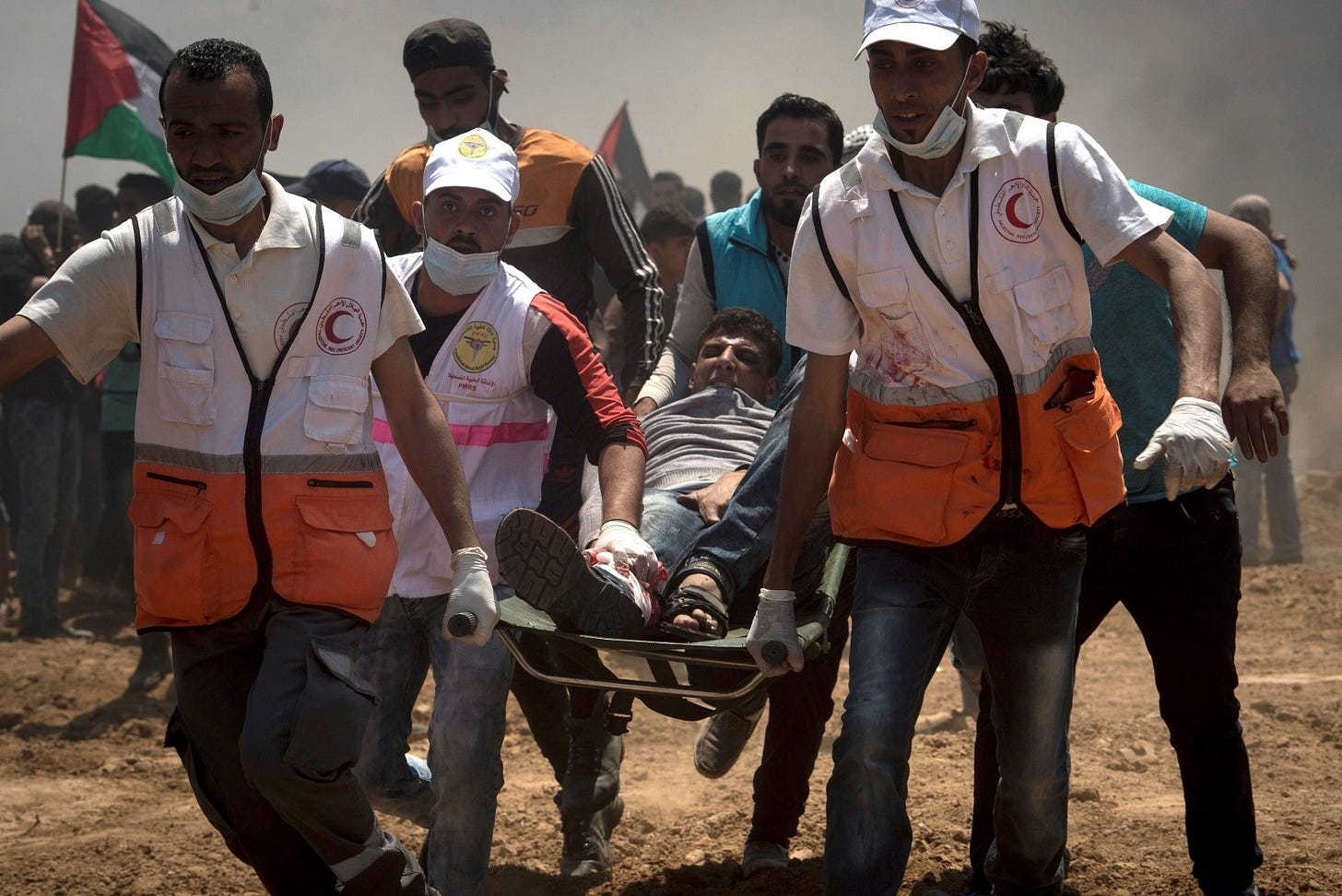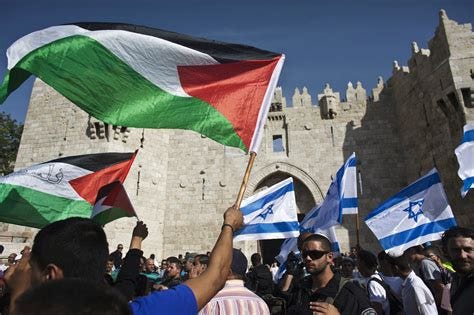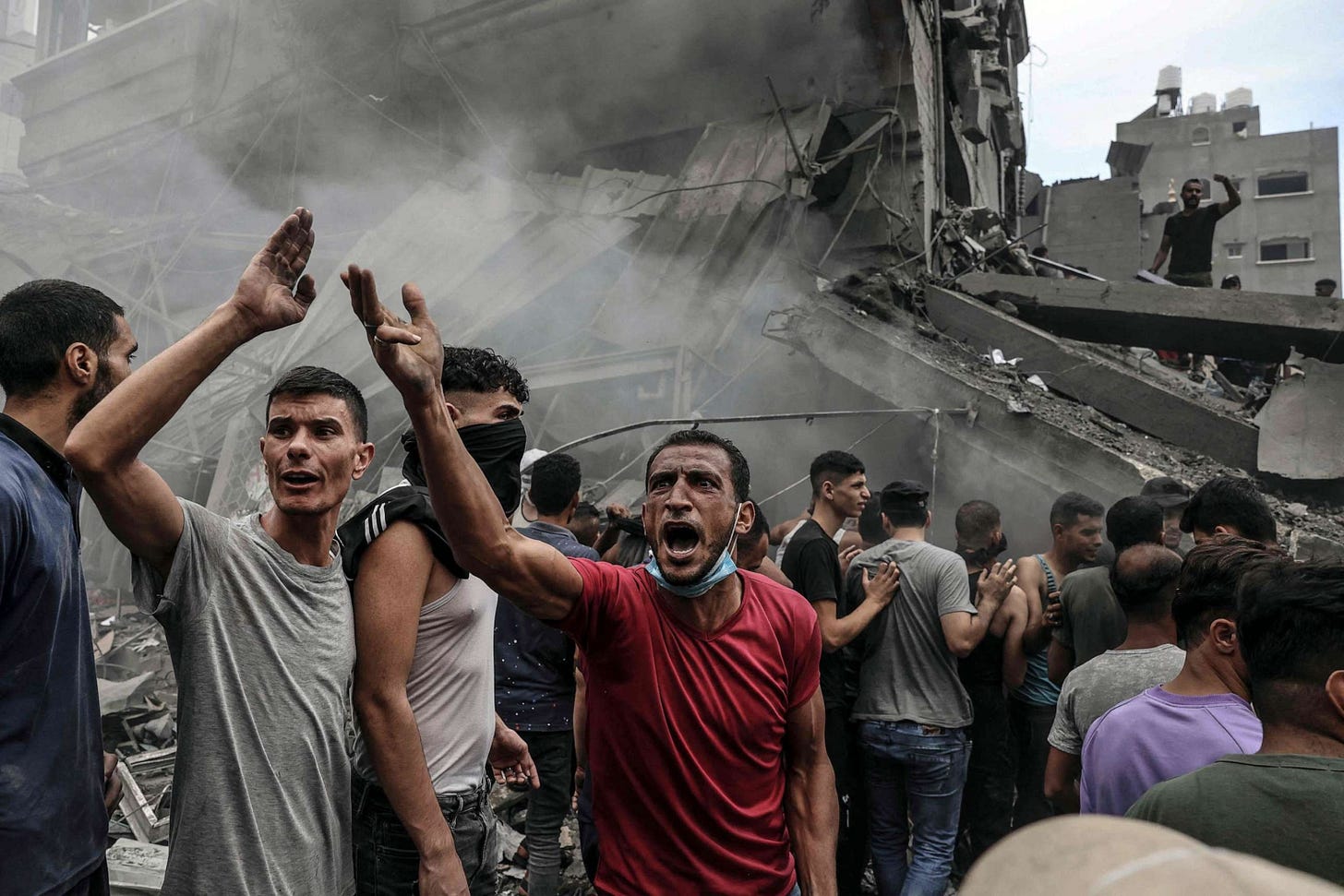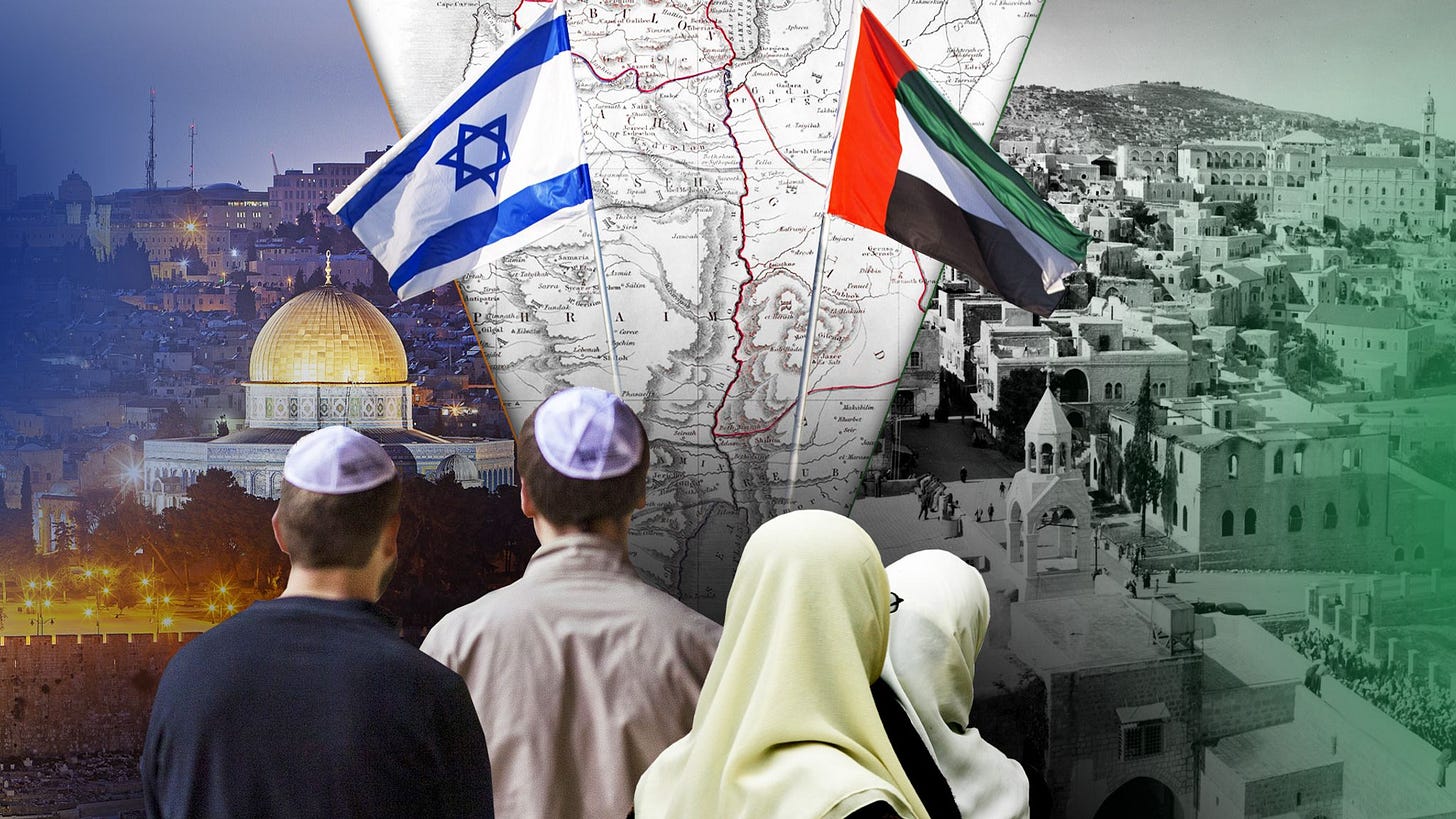If It Happened to You, You’d Call It Genocide Too
What Happens When the World Looks Away From Systemic Injustice
This is going to be a long article, so buckle up. In addressing a topic as sensitive as the unfolding humanitarian crisis in Gaza, I felt compelled to delve as deeply as possible into the context, history, and moral dimensions of this tragedy. For those who read on, I hope you’ll find enough information to form your own conclusions about what so many have called a genocide.
As the conflict in Gaza rages on, it’s hard not to be overwhelmed by the daily images of human suffering. Those of us living in relative comfort—unafraid of missiles striking our neighborhoods—often wrestle with a profound sense of helplessness and guilt. I hold my hand up as one of those people: I feel helpless, as though nothing I do can stop the slaughter.
Despite the apparent injustices, people around the world remain divided over who is “right” or “wrong” in this decades-long conflict. But beneath the layers of geopolitics lies a simpler, more heartbreaking narrative: the displacement and dispossession of the Palestinian people.
Understanding the Core Injustice
The conflict between Israel and Palestine is often framed as a complex, centuries-spanning confrontation. Yet, at its core, it revolves around a story of deep injustice: a powerful movement (Zionism) backed by influential international actors displaced an indigenous population, laying the groundwork for a situation that many compare to apartheid or colonial takeovers.
Fully understanding this injustice means examining the historical context of the Zionist movement, its effects on native Palestinians, and how similar scenarios in Western nations would be unthinkable.
A Historical Timeline of Settlement
Ancient History
3000 BCE: Early Canaanite civilizations inhabit the region.
1200 BCE: Israelites establish kingdoms in parts of the land, coexisting with other groups.
586 BCE: Babylonian conquest leads to the exile of many Jews; others remain alongside other communities.
Roman and Byzantine Periods
70 CE: Roman destruction of the Second Temple and dispersal of much of the Jewish population, though some remain.
Byzantine Era: The region is predominantly Christian, with Jewish and Samaritan communities.
Islamic Caliphates (7th-11th Centuries)
638 CE: Arab Muslims conquer Palestine, incorporating it into the Islamic Caliphate. The region becomes predominantly Arab and Muslim, though Christians and Jews continue to live there.
9th-10th Centuries: Jerusalem and other cities flourish as cultural and religious centers under the Abbasid Caliphate.
Crusader and Mamluk Periods (1099-1516)
1099: The Crusaders establish the Kingdom of Jerusalem, displacing Muslim and Jewish populations.
1187: Saladin recaptures Jerusalem, reinstating Muslim control and allowing coexistence of faiths.
13th Century: The Mamluks consolidate control over Palestine, repelling Mongol invasions and Crusader attempts.
Ottoman Empire (1517–1917)
Palestine is a multicultural society under Ottoman rule, with Muslims as the majority and Christians and Jews as minorities.
Late 19th Century: Jewish immigration begins to rise due to the Zionist movement, though Jews remain a small fraction of the population.
Zionist Immigration and British Mandate (1917–1948)
1917: The Balfour Declaration expresses British support for a Jewish homeland in Palestine, igniting tensions with the Arab population.
1920s-1930s: Waves of Jewish immigration (Aliyah) increase, leading to land purchases and displacement of Palestinian farmers.
1936-1939: The Arab Revolt protests British policies and Zionist land acquisition.
The Nakba and Beyond (1948 Onward)
1947: The UN Partition Plan proposes dividing Palestine into separate Jewish and Arab states, with Jerusalem as an international city.
1948: Establishment of Israel displaces over 700,000 Palestinians, with hundreds of villages destroyed.
1967: Israel occupies the West Bank, Gaza Strip, and East Jerusalem following the Six-Day War, intensifying Palestinian displacement and resistance.
Present Day: Continued occupation, settlement expansion, and blockades exacerbate Palestinian suffering and statelessness.
Drawing Parallels to the West
Imagine this in the United States…
To appreciate the magnitude of injustice in Palestine, imagine a displaced group returning to the United States with claims to vast territories—displacing Native Americans and entrenched communities in the process. The uproar would be universal. Yet this mirrors much of what happened in Palestine during the early 20th century.
Native Hawaiian Sovereignty Movements
Native Hawaiians lost their land and sovereignty after the overthrow of the Hawaiian Kingdom in 1893 and the annexation of Hawaii by the U.S. in 1898.
If, supported by international powers, Native Hawaiians reclaimed significant portions of the islands, current residents would likely resist fiercely, sparking conflicts over land, identity, and belonging.
Mexican Land Reclamation
After the U.S. annexed large parts of the Southwest via the Treaty of Guadalupe Hidalgo in 1848, many Mexican landowners were displaced.
If their descendants returned with external backing to claim these lands, the conflict would evoke debates over borders, sovereignty, and historic grievances—much like the tensions seen in early 20th-century Palestine.
Native American Land Restitution
Native Americans have long fought to reclaim lands lost through broken treaties and forced removal. Imagine tribes being granted autonomy over half the U.S. with the help of external actors.
This would provoke backlash from local communities and industries, echoing the widespread resistance seen during the Zionist settlement of Palestine.
These scenarios underscore a common thread: any effort to reallocate land or sovereignty, even when based on historical ties, tends to disrupt existing populations and provoke resistance. Just as Palestinians resisted Zionist settlement in their homeland, communities in the U.S. would undoubtedly react to such upheavals with similar fervour.
Picture it in Europe…
A Return of the Normans to England
The Normans, originally Norse settlers in France, invaded and conquered England in 1066. Over centuries, their descendants blended into English society, losing distinct sovereignty.
Now imagine if descendants of Norman settlers, backed by powerful external actors, returned to England, claiming sovereignty over large territories. Displacing millions of modern Britons to create a Norman homeland would be unthinkable, igniting widespread condemnation and resistance.
A Revival of the Ottoman Empire in the Balkans
The Ottoman Empire controlled much of Southeast Europe for centuries before its decline in the 19th and early 20th centuries.
Picture a scenario where descendants of Ottoman Turks returned en masse, demanding a sovereign state across the Balkans, reclaiming former Ottoman lands. The forced displacement of millions of Greeks, Serbs, Bulgarians, and others would provoke immediate backlash from local populations and the global community.
The Expulsion of German Communities Post-WWII
After World War II, millions of ethnic Germans were expelled from Eastern Europe (e.g., Poland, Czechia, and Hungary) in one of the largest forced migrations in history.
Imagine if their descendants, supported by international powers, returned to reclaim lands across Eastern Europe. Displacing current residents to create space for a new German state would trigger intense resistance, reviving painful memories of war and occupation.
Jewish Claims to Medieval Ghettos in Europe
During the Middle Ages, Jewish communities lived in ghettos across European cities such as Prague, Venice, and Frankfurt before being expelled or assimilated.
If descendants of these communities returned in large numbers to demand sovereignty over former ghetto areas, displacing current residents, it would provoke outrage—not unlike the backlash seen during the Zionist movement in Palestine.
Celtic Reclaiming of Ancestral Lands in France or Spain
The Celts once inhabited vast swathes of Europe, including modern-day France (Gaul) and northern Spain. Today, Celtic culture survives in areas like Brittany and Galicia.
What if a Celtic diaspora returned to France or Spain, demanding sovereignty over ancestral lands and displacing millions? Such a movement would be dismissed as absurd and resisted by the modern populations of these regions.
A Paradox of Justice and the Western Double Standard
This paradox underscores a disturbing reality: while claims to ancestral lands may aim to correct past wrongs, they frequently perpetuate new cycles of suffering. Europe is largely spared from these upheavals, while places like Palestine bear the brunt of “solutions” shaped by power imbalances and selective justice.
By examining parallels to Western nations, we see that international actors have long enforced a double standard. In places like Palestine, the displacement of entire populations has been supported or overlooked. Meanwhile, any attempt to recreate such scenarios in Europe or North America would be immediately denounced. It’s a troubling testament to the role of power and selective empathy in global politics.
The Consequences for Palestinians
Displacement
The Nakba in 1948 displaced over 700,000 Palestinians; today, their descendants number more than 5 million. Many remain stateless refugees throughout the Middle East, trapped in camps in Lebanon, Jordan, Syria, and Palestine itself. International resolutions affirm their right to return, yet they remain in limbo.
Occupation
Since 1967, Israel’s occupation of the West Bank, East Jerusalem, and Gaza has forced Palestinians into a life of military checkpoints, restricted movement, economic stagnation, and widespread poverty. In the West Bank, a maze of checkpoints and military zones fragments communities, crippling daily life and growth.
Violence
Civilians—especially children—bear the brunt of repeated military escalations. Airstrikes, raids, and clashes exact a horrific toll on both human lives and infrastructure. The psychological scars, particularly on children, are profound and long-lasting.
Gaza: The Open-Air Prison
In Gaza, the situation is particularly dire. The blockade imposed by Israel and Egypt since 2007 has created what many describe as an open-air prison. Over two million Palestinians live in a densely populated strip of land, facing severe deprivation and violence.
Humanitarian Crisis
Over 90% of Gaza’s water is unfit for human consumption. Hospitals struggle under shortages of medical supplies. Education suffers under overcrowded schools and the ever-present threat of violence.
Economic Collapse
Gaza’s unemployment rates rank among the highest in the world. The Israeli-Egyptian blockade since 2007 has shuttered industries and suffocated trade.
Constant Threat of Violence
Multiple Israeli military operations (2008, 2012, 2014, and beyond) have devastated civilian infrastructure and claimed thousands of lives. Civilians live in perpetual fear, with schools, hospitals, and homes at risk.
The West Bank: Land, Settlements, and Erosion of Rights
In the West Bank, the expansion of Israeli settlements—deemed illegal under international law—continues to erode Palestinian land and resources.
Land Seizures
Palestinian landowners lose property to settlements, which are heavily subsidised and protected by the Israeli government. This results in fragmented territories that isolate Palestinian communities and make the prospect of a viable state increasingly unfeasible.
Resource Control
Settlers often have access to better infrastructure and resources, including water, which is disproportionately allocated to settlements at the expense of Palestinian communities.
Daily Oppression
Israeli military control means Palestinians live under a two-tiered legal system, with settlers governed by civilian law and Palestinians by military law, leading to systemic inequality.
A Generation Without a Future
The younger generation of Palestinians grows up in an environment of perpetual conflict, without the stability or opportunity needed to thrive.
Trauma and Mental Health
Children in Gaza and the West Bank experience trauma from violence, displacement, and daily hardship. Many have never known a life without checkpoints, military raids, or blockades.
Lack of Opportunity
Restricted movement, crumbling infrastructure, and economic stagnation mean that education and career prospects are severely limited, fostering a sense of despair.
Resistance and Resilience
Despite these challenges, Palestinians continue to resist oppression through protests, cultural preservation, and calls for international solidarity.
A Global Responsibility
The consequences of the Nakba and subsequent occupation are not just a Palestinian issue; they are a global responsibility. International inaction and double standards perpetuate the suffering of millions. For Palestinians, justice remains a distant hope, obstructed by political power plays and entrenched systems of inequality.
Watching From Afar: A Feeling of Helplessness
Observing the ongoing crisis in Palestine from afar often feels overwhelming. The images of destroyed homes, displaced families, and children growing up amidst violence evoke a profound sense of helplessness. I am neither a political leader nor a policymaker; my ability to enact meaningful change is limited to raising awareness, donating to humanitarian causes, and advocating for justice. Yet, these efforts often feel like drops in an ocean of suffering.
This helplessness resonates with accounts from those who watched the Holocaust unfold during World War II. Many ordinary citizens knew of the atrocities—the ghettos, concentration camps, and mass exterminations—but felt powerless to stop them. History now judges the silence and inaction of that era harshly, serving as a sobering reminder that inaction is not neutrality—it is complicity.
Today, we face a similar moral imperative. The plight of Palestinians calls us to act, even in small ways, to alleviate suffering and resist systems of oppression. While we cannot single-handedly reverse history or resolve the deeply entrenched conflict, we can choose to amplify the voices of the oppressed and hold those in power accountable.
What Does It Mean to Act?
Acting from afar can take many forms:
Raising Awareness
Sharing stories, statistics, and perspectives that challenge dominant narratives can help shed light on the realities faced by Palestinians. The battle for justice is often fought in the court of public opinion.
Humanitarian Support
Donations to credible organisations providing aid in Gaza and the West Bank—whether for medical supplies, food, or education—can make a tangible difference.
Advocacy
Writing to elected representatives, signing petitions, and joining advocacy campaigns can put pressure on governments to adopt policies that prioritise human rights and international law.
The Moral Weight of Witnessing
There is a unique moral weight to witnessing atrocities, even from afar. While we may not bear direct responsibility for the actions of governments or military forces, silence in the face of suffering is its own form of failure. Each of us has a sphere of influence—friends, family, social networks—and within that sphere, we can choose to amplify truth, compassion, and solidarity.
Learning From the Past
Reflecting on the Holocaust or apartheid in South Africa, we see how global solidarity and consistent advocacy were pivotal in shaping history. It was the collective efforts of ordinary people, alongside the leadership of the oppressed, that eventually led to change. While the scale of oppression and the geopolitical dynamics may differ, the principles of solidarity remain constant.
A Collective Effort
Feeling helpless is natural, but it is not the end of the story. If enough people take small actions—donating, advocating, and educating—the cumulative effect can challenge entrenched power structures. History teaches us that the persistence of solidarity can eventually break through even the most impenetrable systems of injustice.
Hope Amid Helplessness
In the face of overwhelming odds, hope is a radical act. It is hope that inspires Palestinians to continue resisting occupation, and it is hope that compels us to stand in solidarity. By doing what we can, no matter how small it seems, we honour that resilience and affirm our shared humanity.
When Nonviolent Methods Fail
For decades, Palestinians have employed numerous nonviolent strategies to resist occupation and advocate for their rights. These methods include:
Legal Appeals
Palestinians have brought cases to international courts, including the International Criminal Court (ICC), and sought justice through United Nations resolutions. Despite some symbolic victories, enforcement mechanisms remain weak, and powerful states often shield Israel from accountability.
Peaceful Protests
Demonstrations against settlements, the separation wall, and the blockade of Gaza have been met with tear gas, arrests, and live ammunition. Iconic protests, such as those in Bil'in and Nabi Saleh, highlight the resilience of Palestinian communities but also the brutal repression they face.
Boycotts
The Boycott, Divestment, and Sanctions (BDS) movement aims to pressure Israel to comply with international law through economic and cultural boycotts. While the movement has gained global traction, it is heavily criticised and criminalised in many countries, limiting its effectiveness.
Despite these efforts, many Palestinians feel that nonviolent methods have not led to significant change. When legal systems fail to uphold justice and peaceful protests are met with violence, desperation can leave some feeling that nonviolence is ineffective.
Understanding Armed Resistance
While violence cannot be condoned, it must be understood as a symptom of systemic oppression and the absence of viable alternatives. For Palestinians, decades of land confiscation, displacement, and military occupation have created a situation where the prospects of justice and dignity seem increasingly out of reach. This context does not justify violence but provides critical insight into why some may see it as their only remaining option.
The broader historical context supports this understanding:
Colonial Struggles Worldwide
From Algeria’s war for independence against French colonial rule to South Africa’s anti-apartheid movement, violence often emerged in response to systems of oppression that denied peaceful avenues for change.
The Role of Power Imbalances
Nonviolent methods rely on oppressors being held accountable, either by their own conscience or by external actors. When power imbalances are so severe that accountability is absent, nonviolence alone often fails to bring about transformative change.
The Failure of International Action
One of the key reasons nonviolent methods have struggled to succeed is the lack of international accountability. While global institutions like the United Nations and ICC have frameworks to address such conflicts, their enforcement mechanisms are undermined by political interests:
Selective Justice
Israel enjoys strong backing from powerful allies, particularly the United States, which frequently vetoes resolutions critical of Israel at the UN.
Silencing Resistance
Many governments criminalise or stigmatise pro-Palestinian advocacy, including the BDS movement, labelling it as antisemitic or hostile, further narrowing the avenues for nonviolent resistance.
Human Rights Hypocrisy
The international community often invokes human rights selectively, demanding nonviolence from Palestinians while turning a blind eye to the violence inflicted upon them.
This lack of accountability leaves Palestinians in an impossible position, where peaceful resistance appears futile, and the oppressors face no consequences.
The Need for Global Solidarity
The failure of nonviolent methods is not a reflection of their intrinsic worth but a consequence of the systemic barriers Palestinians face. To ensure these methods succeed, global solidarity and accountability are crucial. This includes:
Pressuring governments to uphold international law and end support for illegal settlements and blockades.
Amplifying Palestinian voices and countering narratives that seek to delegitimise their struggle.
Supporting movements like BDS that seek justice through peaceful means, despite the challenges they face.
History shows that sustained international solidarity can empower nonviolent movements to achieve change. The struggle against apartheid in South Africa, for instance, succeeded not just because of internal resistance but because of global pressure and boycotts.
A Moral Imperative
When nonviolent resistance is met with repression and ignored by the global community, it sends a dangerous message: that the oppressed have no options. Ensuring that peaceful methods are viable is not just a strategic necessity—it is a moral imperative. Only when the international community holds power accountable can nonviolence serve as the true path to justice.
International Complicity: Funding and Arming the Conflict
Despite the overwhelming evidence of systemic human rights abuses and violations of international law, countries like the United States, the United Kingdom, and others have continued to provide Israel with substantial financial aid and advanced weaponry. This support directly enables the ongoing occupation and military actions that have devastated Palestinian lives and infrastructure.
The United States
The U.S. is Israel’s largest benefactor, providing more than $3.8 billion in military aid annually, as part of a 10-year memorandum of understanding signed in 2016. These funds are used to purchase advanced weaponry, such as fighter jets, missile systems, and surveillance technology, much of which is deployed in Gaza and the West Bank.
Military Aid
The Iron Dome missile defense system, funded heavily by U.S. taxpayers, is often highlighted as a defensive tool. However, offensive operations, such as airstrikes in Gaza, also rely on American-supplied weapons and technology.
Diplomatic Shielding
The U.S. frequently uses its veto power in the United Nations Security Council to block resolutions condemning Israel’s actions, further isolating Palestinians from international accountability mechanisms.
The United Kingdom
Arms Exports
Between 2015 and 2020, the UK approved over £400 million in arms sales to Israel, including components for drones, missiles, and other weaponry used in military operations.
Political Stance
Successive UK governments have refused to formally recognise Palestine as a state, maintaining a stance that undermines Palestinian sovereignty.
Other International Actors
European Union
While the EU has criticised Israeli settlements and human rights violations, it remains one of Israel’s largest trading partners, particularly in technology and defense industries.
Canada and Australia
Both nations provide diplomatic and trade support to Israel while downplaying or ignoring the impact of its policies on Palestinians.
The Consequences of International Support
This unwavering backing emboldens Israeli policies, ensuring that accountability remains elusive. When powerful nations provide funding and weapons to a state accused of committing war crimes, they become complicit in perpetuating the violence.
Direct Impact: Weapons supplied by these nations are often used in operations that result in civilian casualties, the destruction of homes, and widespread suffering.
Undermining International Law: By shielding Israel from accountability, these nations weaken the credibility of global institutions like the International Criminal Court (ICC).
A Call for Change
For meaningful progress, international actors must:
End Military Aid
Suspend arms sales and military funding to Israel until it complies with international law.Demand Accountability
Support investigations into alleged war crimes and impose sanctions if violations are confirmed.Recognise Palestine
Push for full recognition of Palestinian statehood to balance the scales of diplomacy.Support Peace Efforts
Redirect resources toward initiatives that promote coexistence and reconciliation, rather than perpetuating conflict.
Until the global community holds Israel accountable for its actions, the cycle of violence will continue, and the principles of human rights and justice will remain compromised.
Understanding the Opposition’s Rationale
To approach this issue with full transparency, it is critical to acknowledge the perspectives and arguments presented by those who support Zionist policies and actions. Supporters often highlight the following:
Historical and Religious Ties
Zionists argue that Jewish people have an ancestral connection to the land of Israel, dating back thousands of years. The re-establishment of a Jewish homeland is seen as both a historical rectification and a religious fulfillment.Safety and Security
Many Israelis and their supporters emphasize that the establishment of Israel was necessary to provide a safe haven for Jewish people, particularly in the wake of the Holocaust. Given the history of persecution, they argue that a secure Jewish state is essential for survival.Self-Defense
Supporters of Israeli policies often frame military actions, including blockades and retaliatory strikes, as defensive measures against groups like Hamas, which have launched attacks on Israeli civilians. They view these actions as necessary to ensure Israel’s security.Legal Foundation
Proponents point to international agreements, such as the Balfour Declaration and the 1947 UN Partition Plan, as legitimizing the creation of Israel. They argue that the establishment of Israel was sanctioned by the global community and is therefore lawful.
While these arguments provide a rationale for Zionist policies, they are often critiqued for ignoring or minimizing the human rights violations and systemic inequalities faced by Palestinians. Recognizing these perspectives is important for fostering constructive dialogue and seeking balanced solutions to the conflict.
The ongoing crisis in Gaza exemplifies the broader injustice faced by Palestinians. The world’s failure to hold Israel accountable for violations of international law has perpetuated a system where Palestinians are dispossessed, displaced, and dehumanized.
Justice for Palestinians requires addressing both historical and contemporary injustices. This means:
Recognising the right of Palestinians to self-determination and statehood.
Ending the blockade of Gaza and allowing Palestinians the freedom to live, work, and move without restriction.
Halting the expansion of settlements and adhering to international law.
Providing a pathway for Palestinian refugees to return or receive compensation.
Reflecting on Universal Values
This issue isn’t about one side versus another; it’s about fairness, justice, and the inherent rights of all people to live in peace and dignity. Palestinians are not merely numbers in a conflict but individuals with hopes, families, and aspirations no different from our own.
As members of a global community, we must challenge injustice wherever it appears. While the past can’t be undone, its legacy can be addressed through empathy, accountability, and steadfast efforts toward genuine peace.
This is not a call to endorse violence or pick a side; it is a plea for humanity. By amplifying voices long silenced and pursuing solutions grounded in justice, we can help build a future where Palestinians and Israelis alike share a life of dignity and equality.
How You Can Help: Charities to Support
UN Relief and Works Agency (UNRWA): https://www.unrwa.org/
Medical Aid for Palestinians (MAP): https://www.map.org.uk/
Islamic Relief Worldwide: https://www.islamic-relief.org/
United Palestinian Appeal (UPA): https://www.upaconnect.org/
Anera (American Near East Refugee Aid): https://www.anera.org/
Sources and References
"The Ethnic Cleansing of Palestine" by Ilan Pappé
"Palestinian Identity: The Construction of Modern National Consciousness" by Rashid Khalidi
United Nations Archives: https://archives.un.org/
Britannica: Historical Overview of Israel-Palestine Conflict https://www.britannica.com/
Council on Foreign Relations (CFR) Timeline: https://www.cfr.org/



